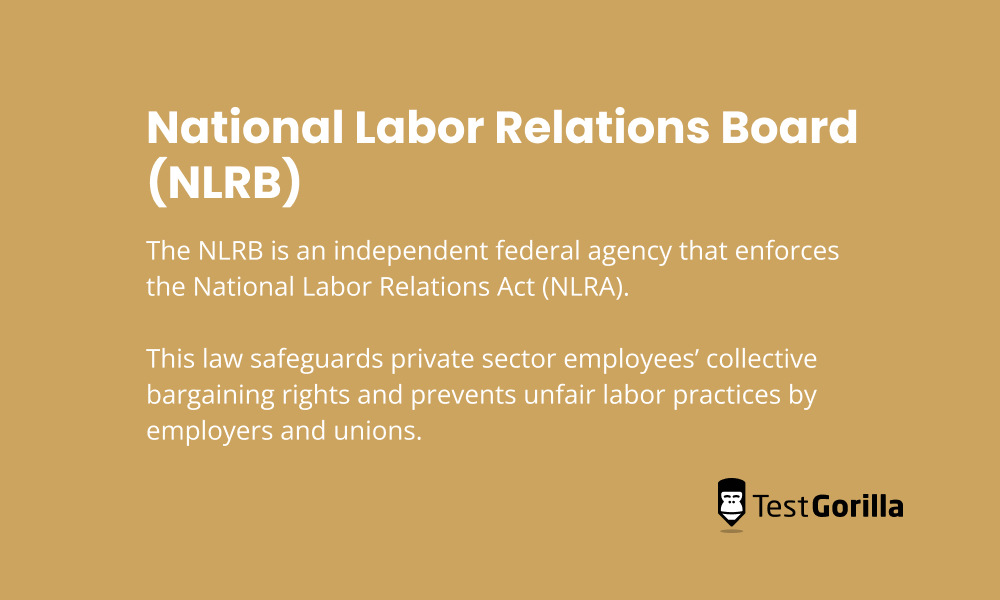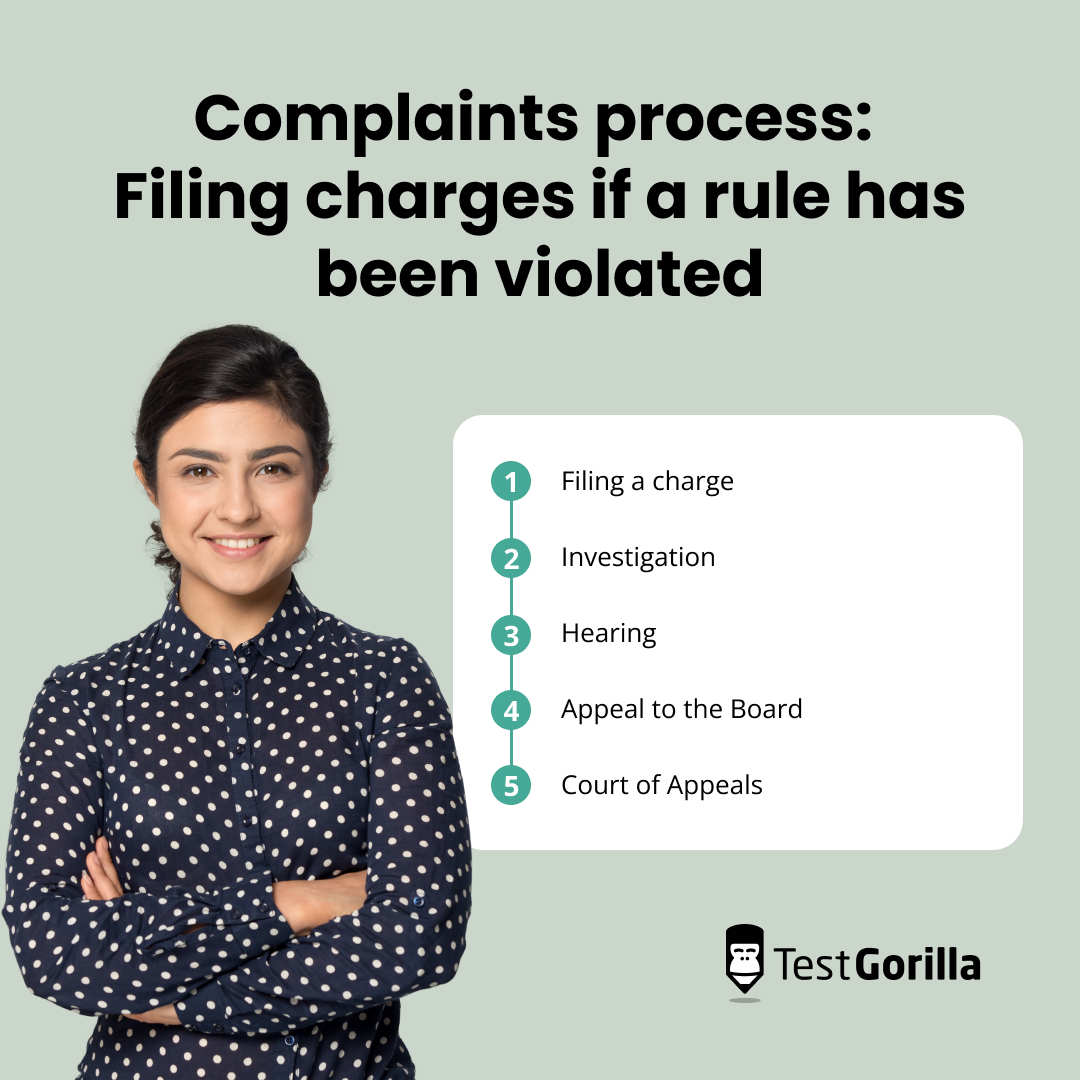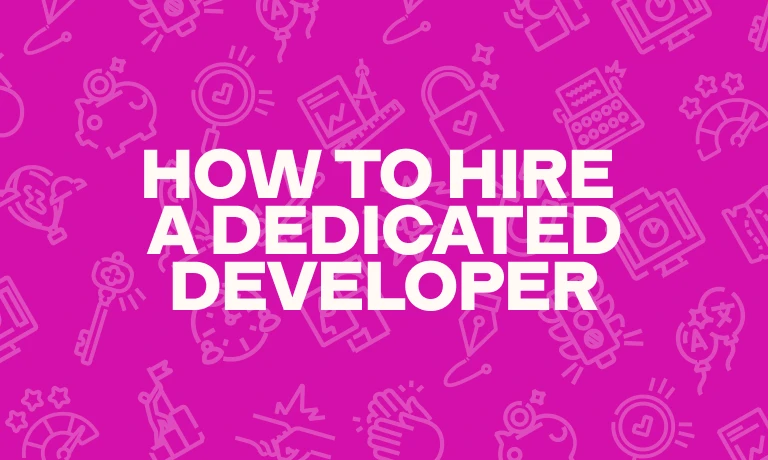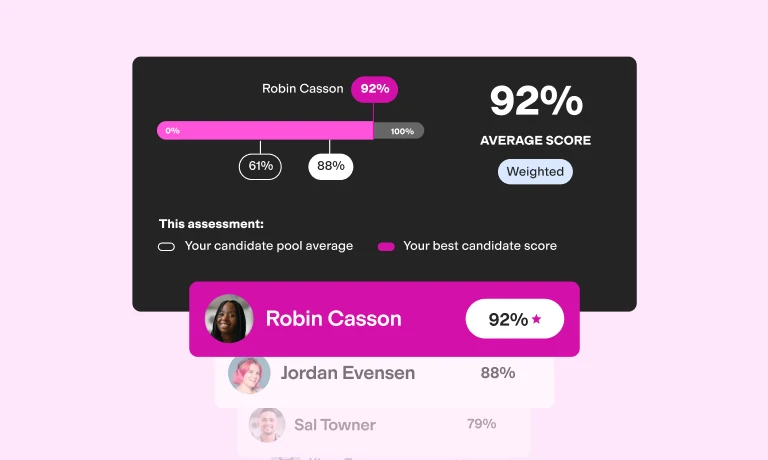The NLRB is a key federal agency that enforces employee rights under the National Labor Relations Act (NLRA). Understanding the NLRB’s role and functions is essential to ensure NLRA-compliant hiring. Otherwise, you risk facing potentially costly hearings and legal consequences.
To help you out, this article looks at who the NLRB applies to and its main functions. We also explain how the NLRB affects your hiring processes, including the interview stage, and the steps you can take to ensure compliance.
What is the National Labor Relations Board (NLRB)?
The NLRB is an independent federal agency that enforces the National Labor Relations Act (NLRA). This law safeguards private sector employees’ collective bargaining rights and prevents unfair labor practices by employers and unions.
The NLRB ensures employees can engage in activities to seek better wages and working conditions – with or without a union – free from fear of employer retaliation.
Created in 1935, the NLRB has headquarters in Washington, DC, and 26 regional offices across various states. The NLRB consists of a five-person board and a General Counsel, with the two arms working independently of each other.
The Board investigates and decides whether violations have occurred, whereas the General Counsel serves as a prosecutor and oversees the processing of cases. The US president appoints individuals to these roles with the approval of the Senate. Board members serve five-year terms and the General Counsel serves four years.
What is the NLRB responsible for?
The NLRB oversees the NLRA to ensure employers and unions don’t engage in unfair labor practices against employees. The NLRB protects employees’ rights to form and join unions, engage in union activities that address or improve working conditions, or choose not to participate in union activities.
As a federal agency, the NLRB’s primary functions are:
Investigating allegations of unfair labor practices. Employees can file charges with the NLRB for investigation into alleged NLRA violations by employers or unions.
Facilitating settlements. A settlement is an out-of-court resolution of a dispute between employees and employers. This approach helps the parties avoid costly litigation. The NLRB says that most unfair labor practice charges are resolved this way.
Deciding cases that are not resolved by settlement. When parties can’t agree on a settlement, an Administrative Law Judge (ALJ) hears and decides the case.
Assisting employees in conducting union elections to form a union or dissolve an existing union. Employees must file a petition with their regional NLRB office to start this process.
The NLRB doesn’t assist with other employment issues, like unpaid wages, workplace discrimination, equality of opportunity, or workers’ compensation. Other federal agencies, like the Department of Labor and the Equal Employment Opportunity Commission, oversee these issues.
Complaints process
Employees can file charges with the NLRB if they believe their employer or a labor organization has violated a rule under the NLRA.
The general process for this involves:
Filing a charge. Employees must file a charge with the Regional Director of their regional NLRB office within six months of the alleged violation.
Investigation. The regional office investigates the complaint to decide whether to take formal action – in other words, issue a complaint. This process typically takes seven to 14 weeks. The parties may agree to a settlement before or after the NLRB issues a complaint.
Hearing. If the NLRB issues a complaint, it sends the case to an ALJ for hearing. ALJs are independent judges who hear administrative disputes involving federal agencies. These hearings are conducted like a trial and involve witnesses, experts, and documentary evidence. The ALJ hears the evidence and issues an initial decision.
Appeal to the Board. If either party disagrees with the initial decision, they can appeal it to the Board.
Court of Appeals. If a party wants to appeal a decision of the Board, they go to the relevant Court of Appeals. In some situations, they may also be able to appeal to the US Supreme Court.
The best insights on HR and recruitment, delivered to your inbox.
Biweekly updates. No spam. Unsubscribe any time.
Which employees are protected?
Most private sector employees are protected by the NLRB, including retailers, non-profits, the food and beverage sector, healthcare facilities, and private universities.
Specifically, the NLRB oversees the rights of employees of private-sector organizations conducting interstate business that exceeds a certain amount. This amount depends on the industry. For example, the NLRB oversees retail organizations with a gross annual volume of business of $500,000 or more.
Who isn’t protected by the National Labor Relations Board (NLRB)?
The NLRB doesn’t cover:
Public sector employees, including public schools and libraries
Agricultural and domestic workers
Independent contractors
People employed by their parents or spouse
Air and rail carrier employees (the Railway Labor Act applies to these workers)
Supervisors (with some exceptions)
What is the difference between the National Labor Relations Board (NLRB) and the Federal Labor Relations Authority (FLRA)?
The NLRB and FLRA are both independent federal agencies. Like the NLRB, the FLRA hears and decides allegations of unfair labor practices and facilitates union elections. While they serve similar functions, the two agencies protect different groups.
The NLRB protects most private-sector employees, whereas the FLRA enforces the rights of non-postal federal employees. The FLRA administers the Federal Service Labor-Management Relations Statute, which safeguards certain non-postal federal employees’ right to join a union and engage in collective bargaining.
Why is the National Labor Relations Board important in recruitment?
In addition to employees, the NLRA applies to job applicants who are “genuinely interested in a job” with the employer.
This genuine interest requirement developed in response to some unions overwhelming employers with union applicants and then using their rejected applications to file a charge against the employer with the NLRB. As a result, you can’t discriminate against genuine candidates based on their membership – or non-membership – of a union.
To avoid this, you shouldn’t ask questions or make other inquiries about an applicant’s membership or connection to a union during the hiring process. Although there isn’t a law against this, doing so may attract allegations of unfair labor practices.
It’s essential to train hiring managers on their obligations under the NLRA and remove any questions regarding union membership from job applications. You can also ensure your employment contracts comply with the NLRA by having them reviewed by someone in-house with contract law qualifications or an external attorney.
What managers need to be aware of
Understanding whether the NLRA applies to your business is the first step. Keep in mind that this law covers most private employers. The NLRB website is a good starting point for learning more about this.
If the NLRA applies to your business, it must comply with the rules under it. As an example, under the NLRA, employers can’t prevent or penalize employees for:
Joining a union
Engaging in union activities
Working together to improve wages or working conditions
Employers also can’t retaliate against employees for filing a complaint with the NLRB.
Businesses that violate the NLRA may face investigations and hearings before the NLRB. Where an employer is found to have breached the NLRA, potential remedies include:
Backpay
Reinstatement of the employee
Stopping unlawful practices
Consequential damages, including legal fees and the costs of searching for work after wrongful termination
If you’re unsure of your obligations under the NLRA, or your business has been notified of an NLRB charge, you should speak to an attorney who specializes in employment law.
Support fair hiring practices with TestGorilla
The NLRB is a federal agency that enforces the NLRA and protects private-sector employees from unfair labor practices.
Complying with the NLRA helps you minimize the risk of facing NLRB complaints. It also supports fair hiring practices in your organization, ensuring you don’t discriminate against applicants based on their union membership.
Use TestGorilla to support fair hiring practices in your organization. Incorporate pre-employment testing in your selection process for data-driven, unbiased insights into candidates. Customize assessments with cognitive ability, personality, and role-specific skills tests for a tailored evaluation.
Try TestGorilla’s free plan today to see how we can streamline your hiring process while making it fairer for applicants.
Disclaimer
The information in this article is a general summary for informational purposes and is not intended to be legal advice. Laws are subject to constant change, and their applications vary based on your individual circumstances. You should always seek legal advice from a qualified attorney about your legal obligations as an employer. While this summary is intended to be informative, we cannot guarantee its accuracy or applicability to your situation.
You've scrolled this far
Why not try TestGorilla for free, and see what happens when you put skills first.




















